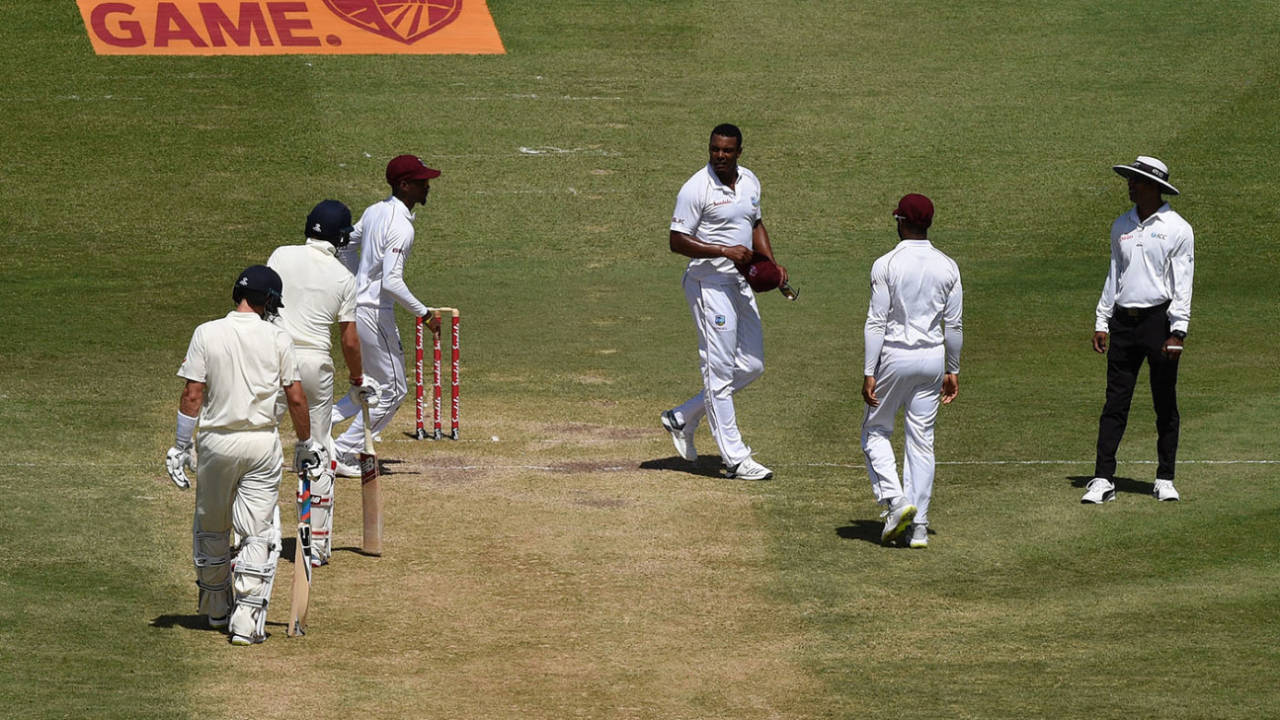Shannon Gabriel charged by ICC after apparent homophobic remark
Exchange picked up by stump mics ended with Root saying: "There's nothing wrong with being gay"
George Dobell in St Lucia
11-Feb-2019
Shannon Gabriel and Joe Root appeared to exchange words • Getty Images
Shannon Gabriel, the West Indies fast bowler, has been charged with an ICC Code of Conduct breach* after making an apparently homophobic remark in an exchange with the England captain, Joe Root, during the St Lucia Test.
Stump mics caught an interaction on the third afternoon of the Test between Gabriel and two England batsmen, Root and Joe Denly, which ended with Root saying: "Don't use it as an insult. There's nothing wrong with being gay."
In a tweet, the ICC confirmed that Gabriel had been charged with a breach of Article 2.13 of the Code of Conduct: "The charge, which was laid by match umpires, will now be dealt with by Match Referee Jeff Crowe. Until the proceedings have concluded, the ICC will not comment further."
Article 2.13 applies to use of "language of a personal, insulting, obscene and/or offensive nature", with a range of charges covering different levels of seriousness.
After England had wrapped up victory on the fourth evening, Root said he hoped the incident would not tarnish the series but that international players had a "responsibility to go about things in a certain manner".
"The ICC have got to handle things and I am not in a position to comment but throughout the series it has been played in the right manner between the two sides," he said."West Indies have played some fantastic cricket, they are a good bunch of guys and it would be a shame if it tarnishes it. It has been a good hard-fought series. As a player you feel you have responsibilities to uphold on the field and I stand by what I did.
"I just did what I thought was right. You have responsibility to go about things in a certain manner on the field and it felt appropriate to act how I did."
Although the mics did not catch Gabriel's earlier comments, it is understood the umpires spoke to him about them at the time. No action was taken initially, but the incident attracted widespread media action, with Stonewall, the UK equality charity, praising Root's stance on the issue.
Kirsty Clarke, director of sport at Stonewall, told Press Association Sport: "Language is really influential and it's great if Joe Root was willing to challenge potentially abusive comments.
"The more players, fans, clubs and organisations that stand up for equality in sport, the sooner we kick discrimination out and make sport everyone's game.
"Stonewall research shows more than half of British people (58 per cent) believe it's important anti-LGBT language is challenged at live sporting events."
Root was reluctant to draw attention to Gabriel's remarks once play had finished on the third day. He seemed to accept the fast bowler may have said something inappropriate, but was not understood to have reported it to officials and suggested such exchanges should stay on the field.
"Sometimes people say things on the field that they might regret, but they should stay on the field," Root said.
"It's Test cricket and he's an emotional guy trying to do everything he can to win a Test match. He's a good guy who plays hard cricket and is proud to be in the position he is. The battle was a good contest, he's had a wonderful series and he should be proud."
Nasser Hussain, the former England captain, said that Root's actions had been hugely significant. "I don't know who said what to whom…but boy do I applaud Joe Root's reaction here," Hussain wrote on Twitter. "For me his twelve words as a role model will be in the end more important than a test hundred or possible victory."
Richard Pybus, West Indies' interim coach, said he was not aware of the comments but suggested that, if they were deemed "untoward", it would be addressed.
"Nothing has been reported to me," he said. "But if a comment was made, we'll review it. And, if it was untoward, we'll be addressing it."
The incident may speak of a culture clash as much as anything. Radio stations in some parts of the Caribbean regularly play music with lyrics that would be viewed as homophobic and unacceptable in the UK - or many other places - while some homosexual acts remain illegal across much of the region.
*February 12, 8pm GMT - This story was updated with the ICC Code of Conduct charge
George Dobell is a senior correspondent at ESPNcricinfo
